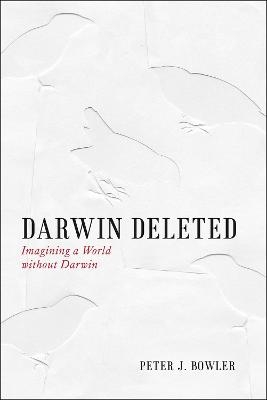
Darwin Deleted
Imagining a World without Darwin
Seiten
2013
University of Chicago Press (Verlag)
978-0-226-06867-1 (ISBN)
University of Chicago Press (Verlag)
978-0-226-06867-1 (ISBN)
The ideas and terminology of Darwinism are so pervasive these days that it seems impossible to avoid them, let alone imagine a world without them. In this title, the author asks: What if Charles Darwin had not returned from the voyage of the Beagle and thus did not write "On the Origin of Species"?
The ideas and terminology of Darwinism are so pervasive these days that it seems impossible to avoid them, let alone imagine a world without them. But in this remarkable rethinking of scientific history, Peter J. Bowler does just that. He asks: What if Charles Darwin had not returned from the voyage of the Beagle and thus did not write "On the Origin of Species"? Would the absence of Darwin's book have led to a different sequence of events, in which biology developed along a track that did not precipitate a great debate about the impact of evolutionism? Would there have been anything equivalent to "social Darwinism," and if so would the alternatives have been less pernicious and misappropriated? In "Darwin Deleted", Bowler argues that no one else was in a position to duplicate Darwin's complete theory of evolution by natural selection. Evolutionary biology would almost certainly have emerged, but through alternative theories, which were frequently promoted by scientists, religious thinkers, and moralists who feared the implications of natural selection.
Because non-Darwinian elements of evolutionism flourished for a time in the real world, it is possible to plausibly imagine how they might have developed. Bowler's unique approach enables him to clearly explain the non-Darwinian tradition and fully elucidate the ideas of other scientists, such as Richard Owen and Thomas Huxley, whose work has often been misunderstood because of their distinctive responses to Darwin. "Darwin Deleted" boldly offers a new vision of scientific history. It is one where the sequence of discovery and development could have led to an alternative understanding of the relationship between evolution, heredity, and the environment-and, most significantly, a less contentious relationship between science and religion, avoiding the polarized attitudes that shape the conversation today.
The ideas and terminology of Darwinism are so pervasive these days that it seems impossible to avoid them, let alone imagine a world without them. But in this remarkable rethinking of scientific history, Peter J. Bowler does just that. He asks: What if Charles Darwin had not returned from the voyage of the Beagle and thus did not write "On the Origin of Species"? Would the absence of Darwin's book have led to a different sequence of events, in which biology developed along a track that did not precipitate a great debate about the impact of evolutionism? Would there have been anything equivalent to "social Darwinism," and if so would the alternatives have been less pernicious and misappropriated? In "Darwin Deleted", Bowler argues that no one else was in a position to duplicate Darwin's complete theory of evolution by natural selection. Evolutionary biology would almost certainly have emerged, but through alternative theories, which were frequently promoted by scientists, religious thinkers, and moralists who feared the implications of natural selection.
Because non-Darwinian elements of evolutionism flourished for a time in the real world, it is possible to plausibly imagine how they might have developed. Bowler's unique approach enables him to clearly explain the non-Darwinian tradition and fully elucidate the ideas of other scientists, such as Richard Owen and Thomas Huxley, whose work has often been misunderstood because of their distinctive responses to Darwin. "Darwin Deleted" boldly offers a new vision of scientific history. It is one where the sequence of discovery and development could have led to an alternative understanding of the relationship between evolution, heredity, and the environment-and, most significantly, a less contentious relationship between science and religion, avoiding the polarized attitudes that shape the conversation today.
Peter J. Bowler is professor emeritus of the history of science at Queen's University Belfast. His books include Evolution: The History of an Idea, The Eclipse of Darwinism, The Non-Darwinian Revolution, Charles Darwin: The Man and His Influence, Monkey Trials and Gorilla Sermons, Life's Splendid Drama, and Reconciling Science and Religion, the latter two also published by the University of Chicago Press.
| Erscheint lt. Verlag | 5.4.2013 |
|---|---|
| Sprache | englisch |
| Maße | 16 x 23 mm |
| Gewicht | 595 g |
| Themenwelt | Geisteswissenschaften ► Geschichte ► Regional- / Ländergeschichte |
| Naturwissenschaften ► Biologie ► Evolution | |
| Sozialwissenschaften | |
| ISBN-10 | 0-226-06867-6 / 0226068676 |
| ISBN-13 | 978-0-226-06867-1 / 9780226068671 |
| Zustand | Neuware |
| Haben Sie eine Frage zum Produkt? |
Mehr entdecken
aus dem Bereich
aus dem Bereich
Erinnerungen
Buch | Softcover (2024)
Pantheon (Verlag)
16,00 €
Universalgelehrter, Polarreisender, Entdecker
Buch | Hardcover (2024)
mareverlag
28,00 €


